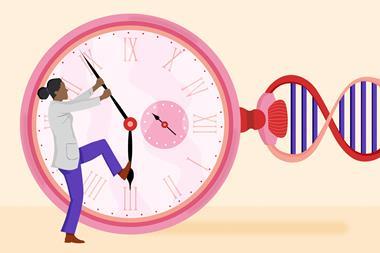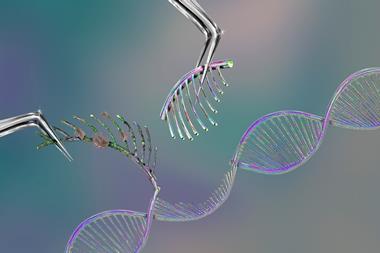Telomerase is unlikely to be a straightforward elixir of youth
You won’t find the elixirs of immortality prepared by alchemists in ancient China on sale today. With ingredients including mercury and its main ore (cinnabar) and highly toxic arsenic sulfides (realgar and orpiment), they would not exactly have the effect on longevity that was hoped by ancient emperors. Yet the dream of an elixir of youth remains as potent as ever, and among the modern varieties – seemingly as validated by science as the old alchemical ones were in their day – are telomerase creams. ‘By restoring activity of an enzyme called telomerase, this cream enhances skin cell longevity right down to your DNA’ says one advert, offering a small jar for just $33.75 (£26.75). (A snip compared to Estée-Lauder’s ‘telomere-lengthening’ Re-Nutriv Ultimate Diamond, containing truffle extract and costing $435 a bottle.)
The telomere story is well rehearsed. ‘Telomeres are tiny “caps” at ends of each DNA strand’, the advert explains. ‘They keep those strands safe from a wide variety of challenges – and the longer your DNA’s telomeres are, the more robust their protective qualities are going to be.’ But it seems the story is not that simple, and a new study suggests that long telomeres might not be such a great thing at all.
Telomerase has been touted as the fountain of youth
Let’s stay with the anti-ageing cream for a moment. It claims to boost the activity of the telomerase enzyme, which maintains the telomere sections at the ends of our chromosomes, using ‘a herb that’s been used in China for centuries’, called astragalus root. Astragalus membranaceus is indeed a long-standing ingredient of traditional Chinese medicine, where it is known as huangqi. It seems to possess genuine anti-inflammatory and antioxidant properties, and some tests on animals and cell cultures have shown that one component of the extract does activate telomerase, and perhaps even lengthens telomeres in humans . It might increase the health span of ageing mice, although not their longevity. In short, to find any evidence that astragalus extract will make you look younger or live longer, you’ll end up scavenging for scraps in the grey literature. But then, as the advert says, ‘These statements have not been evaluated by the Food and Drug Administration.’
All the same, long telomeres and active telomerase are good news, right? Telomerase has been touted as the fountain of youth ever since it was discovered in Nobel-winning work in the 1980s. A study in 2011 showed that, while mice engineered to lack the enzyme entirely aged faster and suffered from age-related adverse health conditions, reactivating telomerase in the mice in adulthood could reverse these problems.1 That’s fine, but no one imagined that having no active telomerase could be a good thing. Worse, it has been long known that mutations that make telomerase unusually active are associated with cancer: the enzyme seems able to boost the growth of tumours.
Evidence for the adverse effects of over-active telomerase has accumulated since. In 2020, researchers at Rockefeller University showed that indeed telomere shortening seems to play a vital role in preventing tumorigenic cell proliferation, and that a gene mutation that promotes long telomeres increases cancer risk.2 And now a new study shows that mutations to a protein called POT1 that influences telomere length can increase the risk of cancer and blood disorders.3 Sure, particularly short telomeres can be problematic, but so can long ones.
So the real effects of telomerase, and of longer or shorter telomeres, are complicated. If those rejuvenating telomerase-boosting creams really have that effect (which is by no means clear), you can’t be certain if it’s a good or a bad thing. It’s unlikely to be as hazardous as ingesting mercury or arsenic, but you’d be tampering with a biochemical process implicated in a complex system of cell maintenance and cell cycling, with results that would be hard to predict. ‘Telomere rejuvenation is potentially very dangerous unless you make sure that it does not stimulate cancer’, one expert told Nature after the 2011 study.
All this should surprise no one. The idea that telomeres are somehow the key to longevity is mistaken, and trying to alter their length is probably not wise. Ageing, like most ubiquitous physiological processes, is a very complex and multifactored phenomenon, in which telomere length is not even the dominant issue. The idea that we can simply tweak a molecule and expect to see a significant and predictable health outcome in such a case is not only flawed but perhaps dangerously so. Not necessarily because it will cause more problems than it solves, but because it encourages a misleading picture of biology in which complex effects can be traced back to simple molecular causes.
References
1 M Jaskelioff et al, Nature, 2011, 469, 102 (DOI: 10.1038/nature09603)
2 I Schmutz et al, eLife, 2020 9, e61235 (DOI: 10.7554/eLife.61235)
3 E A DeBoy et al, New Engl. J. Med., 2023, DOI: 10.1056/NEJMoa2300503

















No comments yet